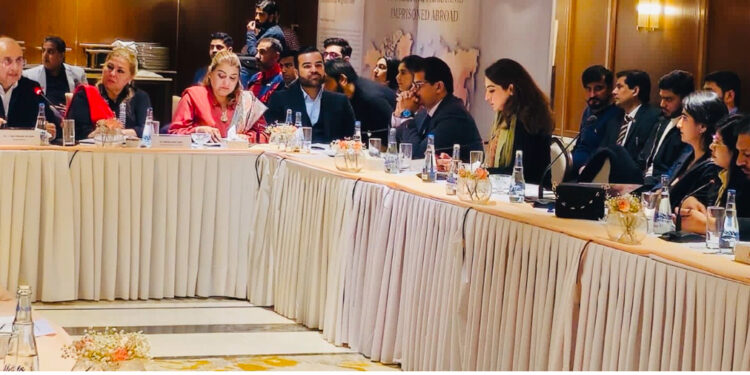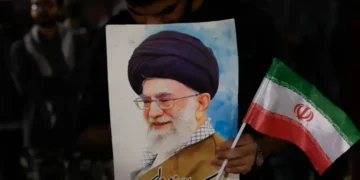ISLAMABAD, Thursday, December 12, 2024: A high-level policy dialogue, organised by the National Commission for Human Rights (NCHR) and Justice Project Pakistan (JPP) on Thursday, highlighted the urgent need for robust policy and institutional reforms to protect the fundamental human rights of Pakistanis imprisoned abroad, as per the Pakistan’s Constitution and international obligations.
The dialogue brought together key representatives from the Supreme Court of Pakistan, Ministry of Human Rights, Ministry of Overseas Pakistanis and Human Resource Development, Ministry of Foreign Affairs, Ministry of Interior, members of the Parliament, National Human Rights Institutions (NHRIs), diplomats, FIA and civil society actors.
The statistics shared at the event show that 23,456 Pakistanis are imprisoned globally as of February 2024, with 10,432 imprisoned in Saudi Arabia, and 5292 in UAE, 387 in Turkey, 40 in Iraq, 463 in Malaysia, 89 in Sri Lanka, 338 in Qatar, 578 in Oman, 59 in Kuwait, 100 in Iran, 371 in Bahrain, 313 in UK and 598 in Greece. Out of total number, 74 per cent are in Saudi Arabia and the UAE.
Organised in commemoration of International Migrants Day, the event, was aimed at addressing the challenges faced by Pakistani migrants and prisoners detained abroad. The dialogue brought together key representatives from the Ministry of Law and Justice, Ministry of Human Rights, FIA, Ministry of Overseas Pakistanis and Human Resource Development, Ministry of Law and Justice, members of the Parliament, diplomats, and civil society actors. The event featured two thematic sessions focusing on prevention and protection, which explored safe migration practices and enhanced consular protection mechanisms. Discussions also centred on the systemic gaps, including inadequate legal representation, consular assistance, and language barriers faced by detained Pakistanis and development of a comprehensive plan of action to improve support systems for Pakistanis imprisoned abroad.
Speaking on this occasion, Justice Mansoor Ali Shah said “Consular access intersects with the rights to life and dignity. Article 4 of the Constitution of Pakistan places a duty on the Government of Pakistan to ensure its citizen is treated in accordance with the law, ‘wherever he may be’. These rights extend beyond national borders, and are not just diplomatic functions but a state’s legal duty. Consular officers abroad are an extension of the state’s sovereignty which is indivisible and stretches beyond borders. It is an essential function of the State.”
Justice Shah went on to say “It is unfortunate that despite the Lahore High Court’s 2014 directive to the Federal Government to protect our citizens abroad, we still lack a comprehensive consular protection policy. Pakistan must urgently adopt such a policy, centred on the fundamental rights of its people, not just state diplomacy.”
In her opening remarks, Senator Quratulain Marri said that for the person imprisoned abroad and his or her family, it is not only a legal issue but a deep personal tragedy. She acknowledged that the progress that has been made in recent past and stressed the need to build upon those measures. “It requires renewed, coordinated and sustained effort which includes strengthening of diplomatic missions, streamlining and implementing prisoner transfer agreements, focusing on prevention and engaging all stakeholders.”
Chairperson NCHR Rabiya Javeri Agha said that most of these detainees lack access to legal aid, translators or even basic consular support. “Their plight highlights glaring gaps in our international engagement and consular protection systems.” She said that while Pakistan has signed prisoner transfer agreements (PTAs) with 11 countries, including Saudi Arabia and UAE, these agreements remain legally dormant. “Any human rights issue is multi-faceted, and all stakeholders must come together. My appeal to all consular officers in our Foreign Office is to get in touch with the local human rights commissions, who usually have unparalleled access to prisons in their countries and are always willing to help, as we found was the case in Malaysia.”
Senator Zeeshan Khanzada highlighted the importance of making representations to foreign leaders on behalf of Pakistanis jailed abroad, and regulating the current scheme under which migration takes place. MNA Saba Sadiq extended her full support as Parliamentary Secretary Human Rights, and called for cross-party collaboration.
Barrister Aqeel Malik, Government Spokesperson on Legal Affairs, stressed the urgency of passing legislation establishing a framework that protects Pakistani nationals imprisoned overseas. He also questioned the current system for repatriating prisoners: “We need to check these Prisoner Transfer Agreements, and see if they are being implemented.”
Mr. Allah Dino Khowaja (Secretary, MOHR) outlined the need to publicize any existing Prisoner Transfer Agreements, saying it was impossible for people seeking repatriation to lobby for their own rights if they did not know what those were.
Sarah Belal, Executive Director of JPP, said “The recent surge in the Pakistani prisoner population abroad, which has more than doubled from over 12,000 in 2023 to over 23,000 in 2024, as presented to Parliament by the Ministry of Foreign Affairs, underscores the urgent need to address these critical issues. This alarming increase highlights the pressing necessity for reform, making this dialogue an especially timely and important step toward finding solutions.”
The event also featured the sharing of the findings of NCHR research report ‘Perilous Journey’ and the screening of documentaries by NCHR and JPP. Additionally, the event was attended in person by Malaysia’s National Human Rights Institution (NHRI), and virtually by the NHRIs of Bahrain, Bangladesh. Their participation in this strategic roundtable marks the beginning of future collaborations between human rights institutions on cross-border and transnational issues. SUHAKAM’s participation also marked a step forward in protecting the rights of Pakistanis imprisoned in Malaysia and advocating for a prison transfer agreement between the two countries. Such an agreement would allow Pakistanis imprisoned in Malaysia to be repatriated to Pakistan and serve their sentences in their home country.
This year’s International Migrants Day also marked an opportunity to reflect on the contributions of millions of Pakistani migrants who sustain the nation’s economy through billions of dollars in remittances, while simultaneously addressing the vulnerabilities they face abroad. Participants called for reinvigorated inter-ministerial collaboration and sustained momentum to safeguard the rights of overseas Pakistanis, particularly those languishing in foreign prisons.
The NCHR and JPP reiterated their commitment to advocating for the rights of Pakistani migrants and prisoners abroad through strategic policy advocacy and engagement with stakeholders at all levels.




















